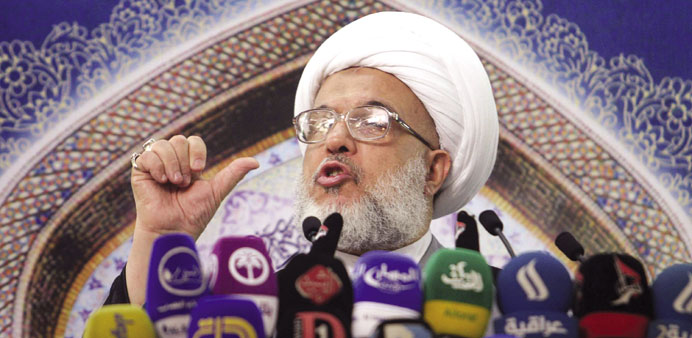Sheikh Abdul Mehdi al-Karbala’i delivers the text of a sermon by Grand Ayatollah Ali al-Sistani in Karbala yesterday.
Reuters/Baghdad
Iraq’s senior cleric yesterday urged political leaders to refrain from clinging to their posts - an apparent reference to Prime Minister Nuri al-Maliki, who has defied demands that he step aside.
Speaking through an aide who delivered a sermon after Friday prayers in the holy city of Karbala, Grand Ayatollah Ali al-Sistani said leaders should show flexibility so that political deadlocks could be broken and Iraq could confront militants.
Last month, Sunni militants from the Islamic State of Iraq and the Levant swept through northern and western Iraq, posing the biggest challenge to Maliki’s Shia-led government since the departure of US forces in 2011.
Critics say Maliki is a divisive figure whose alienation of Sunnis has fuelled sectarian hatred and played into the hands of the insurgents, who have threatened to march on Baghdad.
Sistani said it is time for politicians to think of Iraq’s interests, not their own.
“The sensitivity of this phase necessitates that all the parties concerned should have a spirit of national responsibility that requires the practice of the principle of sacrifice and self-denial and not to cling to positions and posts.”
Maliki, a Shia, has ruled since an election in April in a caretaker capacity, dismissing demands from the Sunnis and Kurds that he step aside for a less polarising figure. Even some Shias oppose his bid for a third term.
Iraq’s parliament elected senior Kurdish lawmaker Fuad Masum as president on Thursday, a long-awaited step in creating a new government capable of countering the insurgency.
Politicians have been in deadlock over forming a new government since the election. The next step, choosing a prime minister, may prove far more difficult as Maliki digs in.
Sistani’s call for flexibility could hasten his departure as he is seen as a voice of reason in the deeply divided country. A recluse who favours a behind-the-scenes role, he has called for Iraqis to take up arms against the Sunni insurgency.
The insurgents, who changed their name to the Islamic State and declared a caliphate in parts of Iraq and Syria, have put Iraq’s survival as a unified state in jeopardy. The army virtually collapsed in the face of their lightning advance.
Sectarian militias and Kurdish peshmerga fighters have become a critical line of defence against the Islamic State as the militants set their sights on the capital.
US military and Iraqi security officials estimate the Islamic State has at least 3,000 fighters in Iraq, rising towards 20,000 when new recruits since last month’s advance are included.
Aside from military campaigns, insurgents have been stamping out any religious or cultural influences they deem non-Islamic.
Yesterday, the group warned women in the city of Mosul to wear full-face veils or risk severe punishment.
“The conditions imposed on her clothes and grooming was only to end the pretext of debauchery resulting from grooming and overdressing,” said the Islamic State in a statement.

